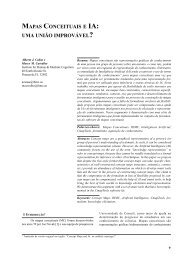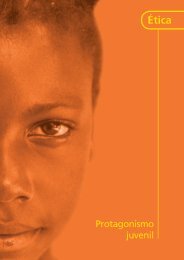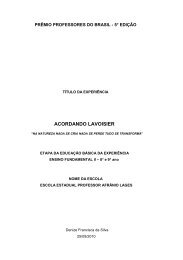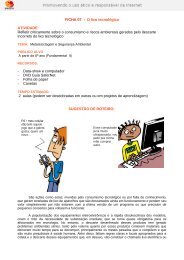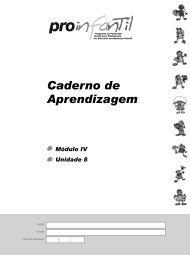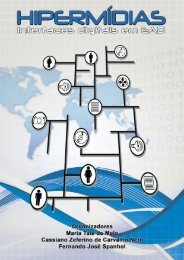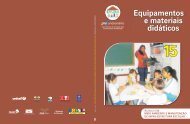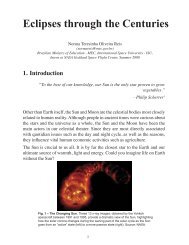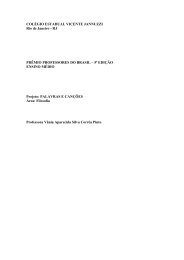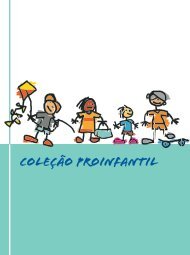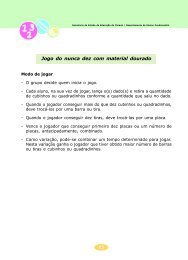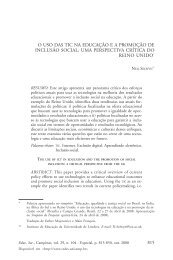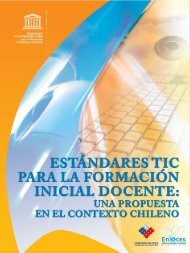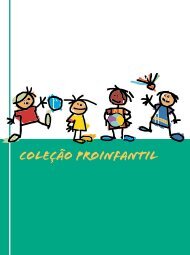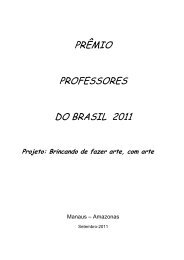BIO-CULTURAL COMMUNITY PROTOCOLS - Portal do Professor
BIO-CULTURAL COMMUNITY PROTOCOLS - Portal do Professor
BIO-CULTURAL COMMUNITY PROTOCOLS - Portal do Professor
Create successful ePaper yourself
Turn your PDF publications into a flip-book with our unique Google optimized e-Paper software.
CHAPTER 2<br />
Bio-cultural Community Protocols as a<br />
Community-based Response to the CBD<br />
Kabir Bavikatte and Harry Jonas<br />
1. Introduction<br />
In the first chapter, we critique the way in which the<br />
international regime on access and benefit sharing (IRABS),<br />
whilst purporting to implement Article 8(j), in fact only<br />
focuses on the commodification of knowledge,<br />
innovations, and practices (referred to here as traditional<br />
knowledge, or TK). We argue that this poses a number of<br />
challenges for bio-cultural communities who face serious and<br />
ever-escalating threats to their ways of life: desperate<br />
exchanges of their TK, which is perceived as tradable cultural<br />
goods under this regime, for benefits (usually limited income)<br />
without any corresponding respect for the inalienable aspects<br />
of their TK. This can further weaken the very bio-cultural<br />
foundations upon which TK is developed. We conclude that<br />
chapter by asking whether it is possible for indigenous peoples<br />
and local communities (ILCs) to assert their rights over their<br />
TK and achieve good access and benefit-sharing (ABS)<br />
agreements that uphold the spirit of Article 8(j) that seeks to<br />
affirm a bio-cultural way of life. In other words, we question<br />
whether it is possible for ILCs to use the IRABS further secure<br />
2. Process and Protocol<br />
The development of a BCP assists communities to overcome<br />
the challenges presented in Chapter 1 in two broad ways.<br />
First, it promotes bio-cultural and legal empowerment by<br />
providing ILCs the opportunity to engage in a process of<br />
reflection and learning. It allows communities time to talk<br />
their bio-cultural heritage, strengthen their management of<br />
local biodiversity and support the ways of life that generate<br />
TK in the first place.<br />
In this chapter, we suggest that the development of biocultural<br />
community protocols (BCPs) are a means by which<br />
communities can respond to the challenges posed to them<br />
by the incumbent IRABS. A BCP is a protocol that is developed<br />
after a community undertakes a consultative process to outline<br />
their core cultural and spiritual values and customary laws<br />
relating to their traditional knowledge and resources, based<br />
on which they provide clear terms and conditions regulating<br />
access to their knowledge and resources. We set out the<br />
process that leads to developing a protocol and, through<br />
examples of BCPs, illustrate how communities are using them<br />
to respond to their challenges and promote their selfdetermined<br />
development plans. We draw on those examples<br />
to argue that BCPs are a practical way for communities to<br />
affirm their rights to manage their TK and natural resources.<br />
about the interconnectedness of the various elements of their<br />
ways of life, including their landscape, GR, TK, culture, spirituality,<br />
and customary laws relating to the management of natural<br />
resources, among others. It subsequently facilitates a<br />
community-wide discussion about their en<strong>do</strong>genous<br />
20



